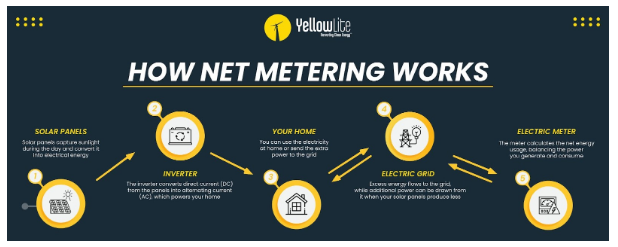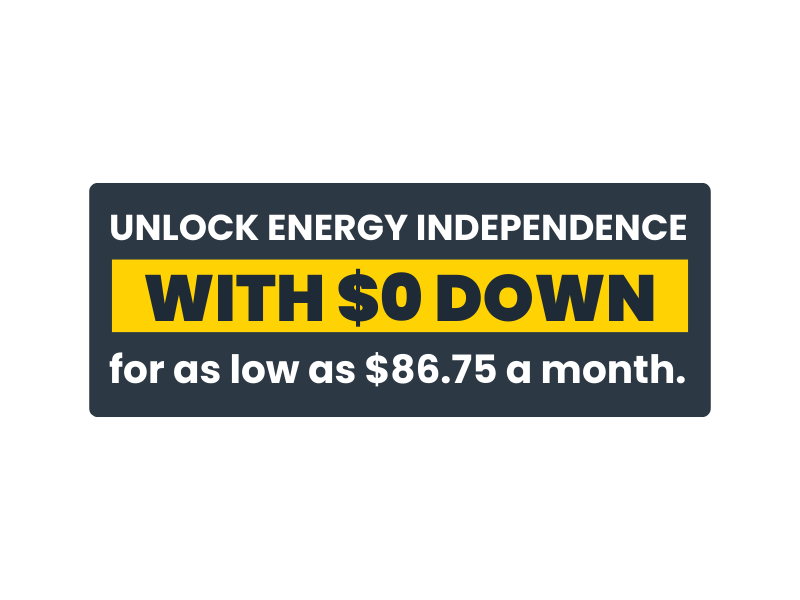In recent years, the worldwide change towards sustainable energy has been fueled by technological advances and a growing awareness of the effects of climate change. In 2024, solar power is expected to be an extremely sustainable solution to sustainability, energy independence, and cost reductions. The environmental and financial benefits of solar power are convincing for residential solar owners, who benefit by saving between 20 and 30 per cent annually on their electric bills. Solar net metering in Ohio further boosts the savings, allowing homeowners to optimise their energy investment.
Looking ahead to 2025, the pace of solar power is set to increase. With solar installations worldwide set to exceed 544 GW by 2024 and the projected capacity to reach 7.4 trillion watts by 2030, net metering will remain a key factor in the energy change. This guide will explore net metering, its concept, advantages, current trends, state policies, and long-term perspectives, giving you the knowledge you require to make educated choices about solar energy.
What is Net Metering?
Net meters are a method of billing that credits solar system owners for the power they generate for the grid. For example, if your solar panels generate more power than your home uses during the daytime, the excess energy is transferred to the grid, and you are credited with credits. You can then utilise these credits to reduce your energy use when your system doesn't produce, like in the evening or on days with cloudy skies.
Contact us if you'd like to know more about solar net metering Ohio policies and how they can benefit you.
How Does Net Metering Work?

Net metering is a straightforward yet powerful system that enables homeowners with solar energy systems to maximize the value of their energy production. By understanding how it works, you can maximise your investment in solar power. Here’s a step-by-step explanation of the process:
1. Solar Energy Production
Your solar panels generate electricity from sunlight during the day. This electricity powers your home, reducing your reliance on the grid.
2. Surplus Energy Sent to the Grid
When your solar panels produce more electricity than your home consumes (e.g., on sunny afternoons when energy demand is low), the excess energy flows back to the utility grid.
- This surplus energy is measured by a bi-directional meter that tracks the energy you consume from the grid and the energy you send back.
3. Earning Credits
You earn credits on your utility bill for every kilowatt-hour (kWh) of excess energy sent to the grid. These credits are applied at a rate determined by your state’s net metering policies, which can vary:
- Retail Rate: In traditional net metering, credits are valued at the same rate you pay for electricity from the grid.
- Wholesale Rate: In alternative models like net billing, credits are valued at a lower wholesale rate.
4. Offset Future Energy Usage
At times when your solar panels aren’t producing enough electricity (e.g., at night or during cloudy weather), you draw energy from the grid. The credits you’ve accumulated are used to offset these costs, often resulting in a significantly reduced or zero electricity bill.
5. Monthly and Annual Settlements
Depending on your state’s policies, any unused credits:
- Roll Over: To the next billing cycle, providing ongoing savings.
- Expire: After a specified period, typically at the end of the annual billing cycle.
Example of Net Metering in Action
Suppose your solar panels generate 1,000 kWh monthly, but your home only consumes 800 kWh. The extra 200 kWh is sent to the grid, earning you credits. The next month, if your home consumes 900 kWh but your panels only generate 700 kWh, the 200 kWh credit from the previous month will cover the shortfall, leaving you with no additional energy cost.
The Role of Bi-Directional Meters
Bi-directional meters are crucial for net metering. They:
- Measure the electricity flowing to and from your home.
- Tracking the energy balance allows utilities to calculate credits based on your net energy contribution to the grid, ensuring accurate billing.
Benefits of Understanding Net Metering Mechanics
- Empowers Decision-Making: Knowing how net metering works helps you optimize energy usage patterns.
- Maximizes Savings: You can accrue more credits by tailoring your energy consumption to peak production hours.
- Supports Energy Independence: With a deeper understanding, you can combine solar panels with battery storage to reduce grid dependency.
By effectively leveraging solar net metering in Ohio, you can enjoy lower energy costs and contribute to a more sustainable energy future.
Net Metering Trends and Policy Updates for 2024-2025
As solar energy use increases, so do innovations and improvements to net metering policy. What can we expect to see between 2024 and 2025?
1. Advanced Energy Storage Integration
States are increasingly encouraging solar panels paired with batteries for storage. These systems enable homeowners to save excess energy for personal needs during peak pricing times, thus enhancing energy independence.
2. Time-of-Use (TOU) Pricing
The pricing of TOU is becoming the norm among utilities. This practice encourages homeowners to use energy in off-peak times to maximize savings while increasing grid efficiency.
3. Dynamic Compensation Structures
Alternative models, such as net billing and feed-in tariffs, are gaining popularity. These systems are designed to balance the need for utility revenue with an equitable compensation system for solar consumers. Examples:
- Net-billing Credits energy surplus at wholesale rates instead of retail rates, providing lower returns but still offering financial advantages.
- Feed-in tariffs require homeowners to pay an agreed-upon amount for the energy they feed into grids, separate from their consumption costs.
4. State-Specific Policy Innovations
States constantly change their policies to promote solar energy while addressing grid demands. Important developments include:
- The Net Billing Tariff of California (NBT): A hybrid model compensating excess energy with wholesale prices.
- Arizona, in addition to Utah, emphasises self-consumption-promoting systems created for individuals with minimal grid dependence.
State-by-State Net Metering Policies (2024-2025)
- Alaska
- Arkansas
- Colorado
- Connecticut
- Delaware
- Florida
- Georgia
- Hawaii
- Illinois
- Indiana
- Iowa
- Kansas
- Kentucky
- Louisiana
- Maine
- Maryland
- Massachusetts
- Michigan
- Minnesota
- Mississippi
- Missouri
- Montana
- Nebraska
- Nevada
- New Hampshire
- New Jersey
- New Mexico
- New York
- North Carolina
- North Dakota
- Ohio
- Oklahoma
- Oregon
- Pennsylvania
- Rhode Island
- South Carolina
- Vermont
- Virginia
- Washington
- West Virginia
- Wisconsin
- Wyoming
There are only three states left that do not offer solar net metering or other forms of compensation for excess solar production:
- Alabama
- South Dakota
- Tennessee
That means only some of the other 47 do offer net metering. Two others do not have compensation policies:
- Idaho
- Texas
In both states, utility companies offer net metering options directly.
While the majority of states offer net metering, the specifics vary. For example:
- California: It now employs a Net Billing Tariff (NBT), a hybrid of net metering that compensates excess energy at wholesale rates.
- Arizona and Utah: Follow similar net billing structures, encouraging energy self-consumption.
States like Alabama, South Dakota, and Tennessee still lack state-mandated compensation policies but allow for utility-specific programs.
-
States that have Net Metering Policy
- Full-Net Metering Many states offer traditional net metering, where credits are calculated based on retail prices.
- Modified Policy States like California have switched to net billing models to reflect the changing grid and utility requirements.
B. States Without State-Mandated Policies
- No Policy: Alabama, South Dakota, and Tennessee do not have compensation mandated by the state in solar energy.
- Utility-specific Programs States such as Idaho and Texas compensate specific utility companies and offer different options.
Factors to Consider for Net Metering Ohio
- Systems Size Caps Capsules for the capacity of credit that is eligible for credit.
- Aggregate caps Limitations on the solar capacity within the utilities service zone.
- Credit Expiry Policy: Rules regarding whether credits that are not used roll over indefinitely or end each year.
For current and accurate policies, the database DSIRE can be a trusted source for up-to-date and detailed policies.
Future Outlook: Net Metering Ohio in 2025 and Beyond
The solar landscape of 2025 will likely see additional advances:
- Greater Accessibility The government's incentives and lower installation costs will help make solar energy more accessible.
- Enhanced grid collaboration The policies are likely to focus on harmonising the generation of energy distributed across grids.
- Global Solar Adoption: The number of GW-scale solar markets is expected to increase to 50 in 2025, further increasing the need for devices such as net meters.
How YellowLite Can Help You Navigate Net Metering Ohio
Moving to solar energy involves navigating complicated policies and technological advances. YellowLite is a specialist in solar energy and an expert in providing customised solar solutions to meet your financial and energy needs.
Our Services
- Custom-designed system designs Solutions tailored based on your energy use and goals.
- Policies Expertise Be informed of the latest net billing and net billing rules.
- Support Continually From installation to routine maintenance, we will ensure that your system operates at its peak performance.
Why Choose YellowLite?
YellowLite stands out as a trusted partner for homeowners and businesses looking to make the most of net metering in Ohio. With years of expertise in the solar industry, YellowLite delivers tailored solutions that go beyond just installation. Here's why choosing YellowLite can transform your solar journey:
1. Local Expertise with a Personal Touch
- Understanding Ohio’s Policies: Net metering rules and incentives can vary by state and even by utility provider. YellowLite’s team is well-versed in Ohio’s specific regulations, ensuring your solar installation complies with the latest net metering policies.
- Customized Solutions: YellowLite doesn’t believe in one-size-fits-all. They evaluate your energy consumption, location, and goals to design a solar system optimized for efficiency and savings under Ohio's net metering policies.
2. Comprehensive Solar Solutions
- Custom-Designed Systems: From roof-mounted systems to ground-mounted arrays, YellowLite creates systems that maximize your energy output and fit seamlessly into your home or business.
- End-to-End Service: YellowLite offers support at every step, from installation and maintenance to guidance on understanding your energy credits and optimizing your net metering benefits.
3. Advanced Technology
- High-Quality Panels and Inverters: YellowLite partners with top manufacturers to ensure your system uses the most reliable and efficient equipment, making the most of Ohio's sunlight and net metering opportunities.
- Energy Monitoring: Advanced monitoring systems allow you to track your energy production and consumption, helping you maximize the benefits of net metering.
4. Commitment to Long-Term Savings
- Cost Savings Expertise: YellowLite works to lower your upfront costs through their knowledge of federal and state incentives, tax credits, and financing options. With net metering in Ohio, they help you minimize energy bills and ensure your savings grow over time.
- Sustainable Investment: Their systems are designed to last 25+ years, providing consistent returns and energy independence long after your initial investment.
5. Customer-Centric Support
- Dedicated Support Team: YellowLite provides ongoing support to ensure your system operates at peak efficiency. Whether it’s maintenance, troubleshooting, or guidance on net metering policies, their team is just a call away.
- Transparent Communication: YellowLite values clear and honest communication, keeping you informed throughout the process and empowering you to make smart energy decisions.
Unlock Solar's Full Potential
Net metering in Ohio is changing, which is the perfect moment to consider investing in solar energy. Start by cutting your energy costs and contributing to a more sustainable future.
Contact YellowLite now to get a quote and begin your journey to a brighter, healthier energy future!
FAQs.
Q1. What is the current status of net metering Ohio?
A1. Ohio offers net metering to residential and commercial solar system owners. Credits for surplus energy sent to the grid are calculated based on retail rates per the current Ohio net metering policy.
Q2. What are the benefits of Ohio solar net metering?
A2. Net metering Ohio allows homeowners to reduce their energy bills, earn credits for surplus energy, and contribute to sustainable energy usage.
Q3. Does Ohio allow the rollover of net metering credits?
A3. Yes, unused net metering credits typically roll over to the next billing cycle in Ohio. However, annual settlements may vary by utility provider.
Q4. How do I qualify for Solar net metering Ohio?
A4. You need an eligible solar energy system connected to the grid to qualify. You must check with your utility provider for specific Ohio net metering rules requirements.
Q5. How does Ohio net metering compare to other states?
A5. Ohio’s policies are competitive, offering retail-rate credit for surplus energy. However, other states may offer additional incentives or programs to complement net metering.
Q6. Is net metering the same as net billing?
A6. No. While net metering credits surplus energy at retail rates, net billing typically credits it at wholesale rates, which may affect your overall savings.
Q7. Can businesses benefit from net metering Ohio?
A7. Absolutely. Both residential and commercial properties can benefit from solar net metering Ohio, significantly reducing operational energy costs.



